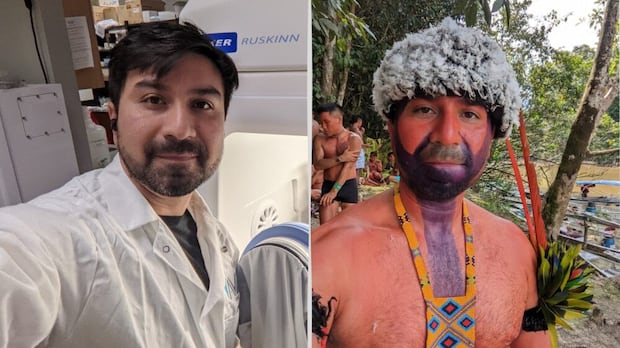Education
Guelph Researcher Explores Amazonian Roots Through Gut Health Study

A researcher from the University of Guelph, David Good, is combining his academic pursuits with a personal journey to explore the microbiome of the semi-nomadic Yanomami community in Venezuela. Good, a PhD candidate, is investigating the healthy bacteria found in the feces of the Yanomami people, who possess one of the most diverse microbiomes globally, as part of his effort to understand human health.
Good’s connection to the Yanomami stems from his mother, providing him a unique perspective on this Indigenous community. His research aims to uncover how the diversity of their microbiome may contribute to combating chronic inflammatory and autoimmune disorders. As Good shared on CBC Radio’s The Morning Edition, “Diversity is really key here … to see if we can better understand how we can … fight against chronic inflammatory and autoimmune disorders.”
Personal Journey into Microbiome Research
Good’s fascination with microbiomes began during a visit to the Amazon, where he sought to reconnect with his heritage. Engaging with the Yanomami culture, he learned about their traditional practices, such as hunting and foraging, which led him to the field of microbiome research. “Being socialized in Western society, but then also being a member through blood and family of that community certainly feels like worlds colliding,” he noted.
The Yanomami’s limited exposure to processed foods has resulted in a microbiome that significantly differs from that of Western populations. This stark contrast is crucial for understanding how dietary habits influence health. Good emphasizes the need to respect the Yanomami’s knowledge and culture, particularly in light of historical exploitation of Indigenous communities in research.
Ethical Research Practices and Community Empowerment
Good is committed to ensuring that his research does not repeat the mistakes of past researchers who often exploited Indigenous knowledge without providing equitable benefits. He collaborates with community members to align his work with their interests and needs. One significant outcome of this collaboration is the establishment of a learning centre that aims to empower Yanomami individuals to conduct their own research.
“This will allow us to train the Yanomami on how to collect samples and understand the implications of microbial diversity loss,” Good explained. The initiative fosters a sense of ownership and agency among the Yanomami, equipping them with the tools necessary for scientific inquiry.
Professor Emma Allen-Vercoe, a Canada Research Chair at the University of Guelph and overseer of Good’s research, highlighted the importance of this ethical approach. She noted that many past researchers adhered strictly to protocols but often overlooked the perspectives and agency of Indigenous peoples. “We need to correct that,” she asserted.
Allen-Vercoe also pointed out the broader implications of Good’s work. By studying the microbiomes of people who have not been exposed to industrialized lifestyles, researchers hope to gain insights into how changes in diet and environment have impacted gut health over time. The rapid lifestyle shifts associated with the industrial age, including reduced exposure to natural foods and increased use of antibiotics, have adversely affected the microbiome of Western populations.
Good’s research not only aims to contribute to scientific knowledge but also to promote a deeper understanding of Indigenous health practices and their significance in today’s world. Through his work, he seeks to bridge the gap between modern science and traditional knowledge, ensuring that future research is conducted with respect and reciprocity.
-

 Politics3 weeks ago
Politics3 weeks agoSecwepemc First Nation Seeks Aboriginal Title Over Kamloops Area
-

 World4 months ago
World4 months agoScientists Unearth Ancient Antarctic Ice to Unlock Climate Secrets
-

 Entertainment5 months ago
Entertainment5 months agoTrump and McCormick to Announce $70 Billion Energy Investments
-

 Lifestyle4 months ago
Lifestyle4 months agoTransLink Launches Food Truck Program to Boost Revenue in Vancouver
-

 Science5 months ago
Science5 months agoFour Astronauts Return to Earth After International Space Station Mission
-

 Technology3 months ago
Technology3 months agoApple Notes Enhances Functionality with Markdown Support in macOS 26
-

 Top Stories2 months ago
Top Stories2 months agoUrgent Update: Fatal Crash on Highway 99 Claims Life of Pitt Meadows Man
-

 Lifestyle2 months ago
Lifestyle2 months agoManitoba’s Burger Champion Shines Again Amid Dining Innovations
-

 Sports5 months ago
Sports5 months agoSearch Underway for Missing Hunter Amid Hokkaido Bear Emergency
-

 Politics4 months ago
Politics4 months agoUkrainian Tennis Star Elina Svitolina Faces Death Threats Online
-

 Politics4 months ago
Politics4 months agoCarney Engages First Nations Leaders at Development Law Summit
-

 Technology5 months ago
Technology5 months agoFrosthaven Launches Early Access on July 31, 2025




















